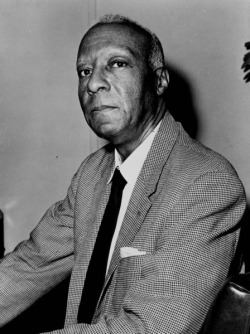Civil Rights.

In 1941, labor and civil rights leader A. Philip Randolph organizes a mass movement that forces President Roosevelt to take steps against racial discrimination in defense industries. The NAACP legal campaign against segregation wins significant victories in the Supreme Court in voting rights, education, and interstate transportation cases. Deadly race riots in Detroit and New York in 1943 are followed by a postwar wave of violence against African-Americans in the South.
Jackie Robinson plays his first game for the Brooklyn Dodgers in 1947, breaking the color bar in major league baseball, and in 1948 President Truman orders the armed forces to begin desegregation.
During this time, only a handful of African-Americans are employed as journalists by white-owned newspapers as the print media are almost completely segregated.
Also...
With the advent of the Cold War the United States government was under intense international pressure to live up to its democratic ideals. President Truman in his January 1947 State of the Union summed it up when he said, "When we fail to live together in peace, the failure touches not us, as Americans, alone, but the cause of democracy itself in the whole world. That we must never forget (1)." When Truman made this comment America was embroiled in a Cold War with its communist nemesis the United Soviet Socialist Republic (USSR). At any instance of racial violence, the USSR could use its propaganda machine to denounce the US on civil rights in an effort to demonize the US internally and appeal to the newly independent countries in Africa and the Middle East which consist of darker skinned peoples, which historically had been discriminated against in the US The leaders within the United States realized that the US must make improvements on civil rights issues if they were going to be the world leader in their fight for Democracy and Freedom. Truman with Executive Order 9008 created the President's Committee on Civil Rights (PCCR). On October 29, 1947 the PCCR issued its report entitled "To Secure These Rights". The PCCR strongly came out in the favor of civil rights condemning discrimination and racial violence in a scathing tone found in few federal documents. The PCCR called for Federal law,
…strengthening of the Civil Rights Section of the Justice Department, an anti-lynching law, abolition of the poll tax, abolition of the poll tax, statutes protecting the right to vote, integration of the military, denial of federal funds to institutions that discriminate and federal laws against discrimination and segregation in employment, interstate commerce, and public accommodations (2).
-CECI
